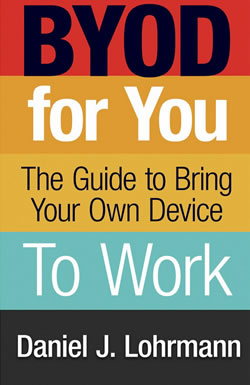 A while ago, one of our authors, Dan Lohrmann, introduced his new book to us: BYOD for You: The Guide to Bring Your Own Device to Work. This is a hot topic today, so I asked him a number questions about his book and how it applies to our readers.
A while ago, one of our authors, Dan Lohrmann, introduced his new book to us: BYOD for You: The Guide to Bring Your Own Device to Work. This is a hot topic today, so I asked him a number questions about his book and how it applies to our readers.
1. What are the potential problems associated with employees bringing their own devices to the workplace?
I like to start with the positive, and there are many positive benefits to bringing your own device to work—such as the simple fact that most people would rather carry one device than two.
If you really like your personal device, you probably bring it to work with you and already use it for various tasks right now. The question becomes, have you thought through likely scenarios?
Things can go wrong. Smartphones and tablets can be lost or stolen—so you need to have password protections and other safety measures in place. I’ve seen lost devices get wiped by an employer, and when the employee found their smartphone again, the vacation pictures were gone forever.
Wider problems can certainly develop regarding the security of work information, your private data, personal ethics, legal issues, understanding various financial aspects, and other related technology topics. The book helps end users better understand their situation and build a personal device roadmap.
2. Is this book something business leaders should read for ideas about good BYOD policies?
I believe it’s important for business leaders to understand the pros and cons of various BYOD options from the employee’s point of view. I cover the answer to that question in the basic outline of the book: addressing the challenges and solutions.
No doubt, there are plenty of articles and free whitepapers available online regarding policies for BYOD, but this e-book is the only guide that I am aware of that addresses the end-user perspective to three very different (gold, silver, and bronze) work situations.
One surprising thing that I have seen during the first few months after BYOD for You was released was that business and technology leaders are more engaged in this topic right now than end-users. I have received more questions and interest from webinar participants and government and private sector leaders than I have from “the average Joe on the Street.”
It seems as if enterprises and especially technology managers are working hard to implement the needed BYOD controls right now, while many end-users “just do it” when it comes to bringing personally-owned devices to work. Sadly, many end users don’t know what they don’t know. Implementing a few helpful tips would go a long way.
3. Why should Christian business owners read this book?
Our personal and professional uses of technology are vitally important in the workplace. The Internet, for example, is an accelerator for good and for evil at the same time. Getting BYOD administered properly for your employees is a basic step in addressing your company’s values and culture.
Business owners need a plan for BYOD. Once that plan is clear, employees need to be trained in practical ways. This book is intended as a primer—to get the conversation going in each important area. There is no doubt that technology is changing fast and it is hard to keep up. Workplace norms and expectations need to set by business owners.
As I‘ve articulated in my first book, Virtual Integrity: Faithfully Navigating the Brave New Web, I believe that business leaders must lead by example and surf their values in cyberspace. This book will point the way for mobile technology in 2013.
4. Does Internet Accountability Software play a role in good BYOD policies and practices? How?
I think it does. As the BYOD trend accelerates, our personal and work technology worlds are merging as never before. We do work from home and personal tasks at work. More and more people use one device.
No longer can you count on workplace web filters in the same ways as you did in the past. Our character, our values, our faith, and our ethics are tested online. A key question is: What controls and tools do you use to help maintain your integrity? Accountability software can certainly help in this process.
More practically, if I was a Christian business owner with staff, I would deploy Covenant Eyes software on each personally owned device to supplement the mobile device management (MDM) software that enforces policies on tablets and smartphones.
Each business needs to decide what the appropriate accountability processes should be. Nevertheless, getting BYOD right in practice is a vital component of succeeding in business.







0 comments.